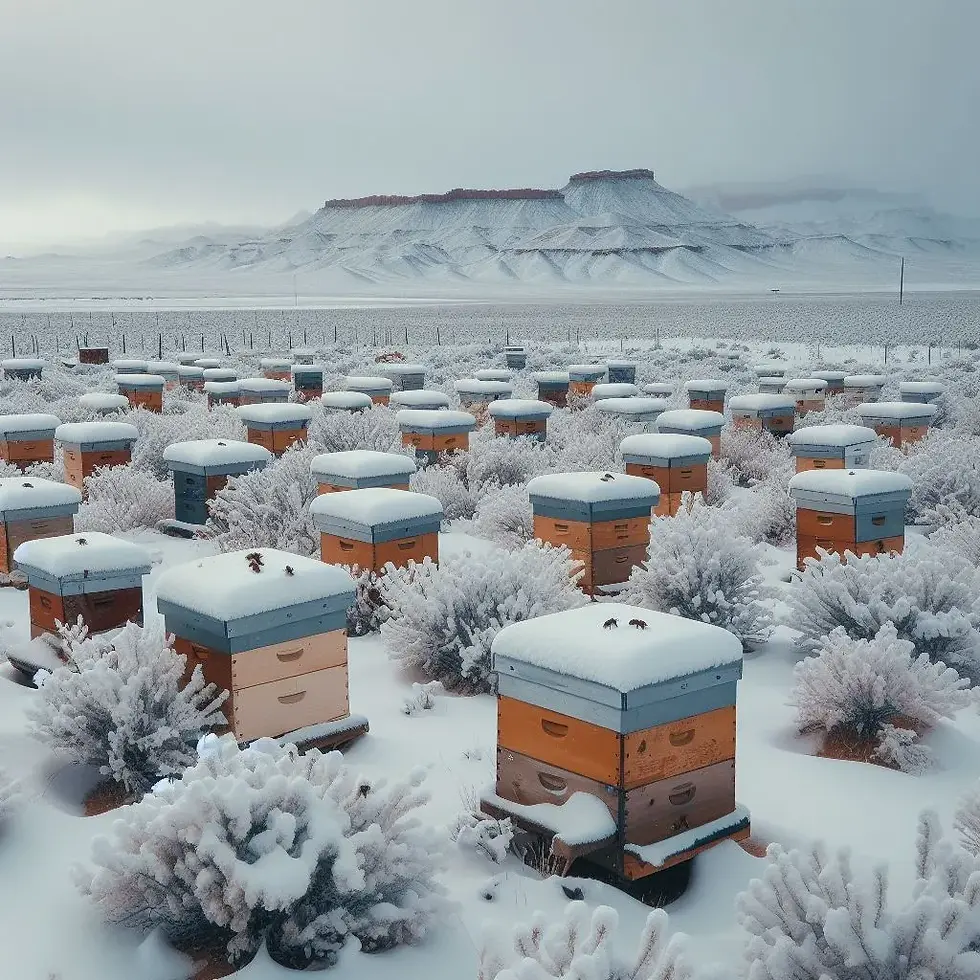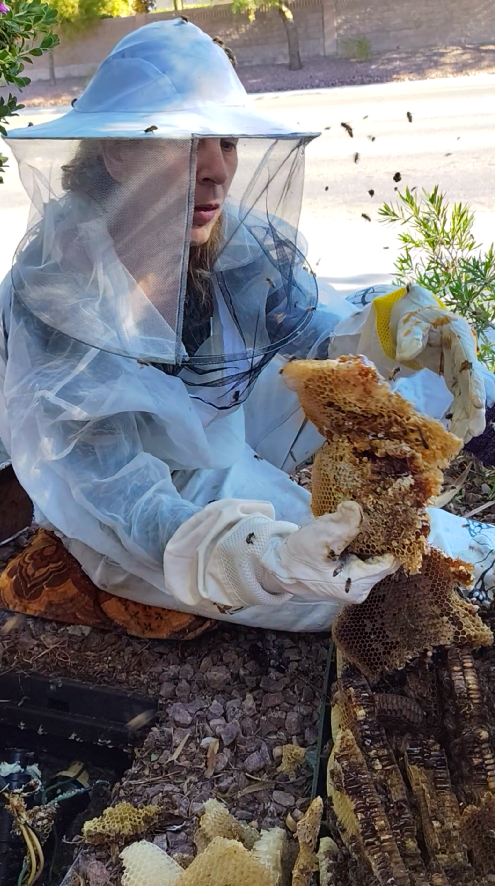Do Bees Like the Snow? Vegas Bees Has The Lowdown
- Pete Rizzo

- Jan 6, 2024
- 5 min read
Updated: May 5, 2025

Do Honeybees Like the Snow? Well, Not Exactly.
Honeybees are often associated with warm, sunny days, buzzing around colorful flowers and working tirelessly to collect nectar. But what happens when the landscape changes from blooming flowers to snow-covered ground?
Do honeybees enjoy the snow? The answer, unsurprisingly, is no—but their relationship with the cold is far more fascinating and complex than a simple dislike.
Bees and Cold Weather: A Delicate Relationship
Honeybees, like all insects, are cold-blooded, meaning they cannot regulate their body temperature internally as mammals do. Instead, their body temperature fluctuates with the external environment.
This makes them particularly sensitive to cold conditions, forcing them to adapt in creative ways to survive.
During the warmer months, honeybees are busy gathering nectar and pollen, converting these resources into honey and bee bread, which serve as their food sources for the winter.
When the weather turns chilly and snow starts to fall, bees must rely on the stores they’ve built up during the active season to make it through the cold months.
How Bees Prepare for Winter
Preparation for winter begins long before the first snowflake hits the ground. As temperatures drop and flowers disappear, honeybees shift their focus from foraging to survival.
They begin to rely on the honey they’ve collected, which will provide the energy they need to maintain warmth inside the hive during winter.
The hive operates as a well-oiled machine, with every bee playing a part in the colony’s survival. During the fall, worker bees reduce their activities and prioritize protecting the queen and their honey stores.
At Vegas Bees, we make sure our hives are well-prepared for the winter by ensuring the bees have plenty of honey to keep them well-fed, stress-free, and insulated from the cold.

Winter Survival Strategies: The Cluster Formation
Once the weather turns freezing and snow blankets the landscape, bees retreat into their hive, forming a tight cluster to survive. This behavior is not hibernation but rather a highly coordinated survival strategy.
Worker bees form a living shield around the queen at the center, vibrating their wing muscles to generate heat and maintain an internal hive temperature of around 95°F.
The bees continuously rotate positions within the cluster, with those on the outer edges moving inward to warm up and those at the center moving outwards to share the task of maintaining warmth.
This constant movement and teamwork are crucial to keeping the queen and the colony alive through even the harshest winter months.
We at Vegas Bees do our best to avoid disturbing the hive during the winter, but occasionally, we’ll quickly check if the bees need additional resources like a pollen patty to help them through.
These brief inspections are done as swiftly and minimally as possible to avoid exposing the bees to cold air.
Snow and Bees: Do They "Like" It?
When we ask whether honeybees “like” the snow, we’re anthropomorphizing these remarkable insects. Unlike humans, bees don’t venture into the snowy landscape for fun or enjoyment.
In fact, cold and snow can be dangerous for honeybees. If a bee gets caught outside in the snow or cold, it may quickly become immobilized and unable to return to the hive. Prolonged exposure can even lead to death.
However, while bees don’t “like” snow in the traditional sense, they’ve adapted over thousands of years to deal with it. Their ability to survive through snowy winters is a testament to their resilience.
At Vegas Bees, we ensure that our hives are insulated during the winter, protecting them from the cold and making sure they have everything they need to make it through the season safely.

Indirect Benefits of Snow for Bees
Though bees themselves don’t actively engage with snow, it can have indirect benefits for their environment. A thick layer of snow acts as an insulator, stabilizing the ground temperature and protecting plant roots from freezing. This is especially beneficial for perennial plants, many of which will bloom again in the spring.
In Arizona, where our apiary experiences some winter snow, we’ve observed how a good snow cover can lead to healthier blooms when the weather warms. These blooms provide bees with the rich nectar and pollen sources they depend on in the spring.
The snow also contributes to the water cycle, helping maintain the overall health of the ecosystem that bees rely on for survival.
The Importance of Winter Preparation: Leaving Enough Honey
One of the most critical aspects of beekeeping during the winter months is ensuring that the bees have enough honey to sustain them through the cold season.
As we’ve seen, bees rely on their honey stores to generate heat and feed the colony during winter. Beekeepers who practice sustainable methods, like those of us at Vegas Bees, know that harvesting too much honey in the fall can leave bees vulnerable.
That’s why it’s essential to leave ample honey in the hive, allowing the bees to "breeze" through the winter months without the stress of running out of food. If the colony doesn’t have enough resources, it could lead to starvation, weakening the hive and possibly leading to its collapse before spring arrives.
We believe that ethical beekeeping involves prioritizing the well-being of the bees over maximizing honey yields, especially during such a crucial time of the year.

Resilience in the Face of Winter
Honeybees may not thrive in the snow, but their ability to endure it is a testament to their incredible resilience and adaptability. They have evolved sophisticated strategies to survive the winter months, from clustering together for warmth to relying on the honey they’ve stored during the warmer seasons.
For beekeepers, it’s a reminder of the delicate balance between caring for the hive and allowing the bees to follow their natural instincts.
By preparing the hive for winter, insulating it properly, and ensuring the bees have enough food, we help our colonies survive the harsh conditions and emerge healthy and strong when spring arrives.
Looking Forward to Spring
While honeybees may not “like” the snow, their capacity to survive it is something to be admired. At Vegas Bees, we’re always looking forward to the arrival of spring, when the bees will once again venture out into the blooming landscape, continuing their vital work of pollination and honey production.
Until then, we keep a close eye on our hives, ensuring they’re warm, well-fed, and ready to face the challenges of winter.
So, here’s to our winter bees, clustered together and keeping their queen warm, patiently waiting for the return of sunny days and vibrant flowers.
As beekeepers, we’re proud to support them through these colder months, ensuring their survival and prosperity for seasons to come.
Betsy and Pete
Las Vegas, Nevada
About Us: The Authors

We're Betsy and Pete, passionate Las Vegas beekeepers trained by a master in the field. With hundreds of successful bee and bee swarm removals under our belts, we're not just experts; we're enthusiasts committed to the well-being of these incredible pollinators.
We manage dozens of beehives, both natural and honey-bearing at our Joshua Tree Preserve.
Our Commitment to Excellence
Education is an ongoing journey, especially in a dynamic field such as beekeeping. That's why we continually update our knowledge base, collaborate with other experts, and stay up to date with the latest advancements in bee control methods and beekeeping practices.
We also provide top-tier beekeeping supplies, offering everything a beekeeper needs, from beginners to experts.
.png)


